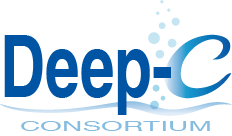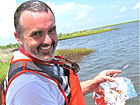MAKING CONNECTIONS
Stories of students connecting with Deep-C science and scientists
An important outcome of the 2010 Deepwater Horizon oil spill has been its value as a teachable event. It has given rise to new and expanded research into the impacts of oil, dispersed oil, and dispersant on the ecosystems of the Gulf of Mexico. It has also focused attention on the importance and relevance of science, technology, engineering and math (STEM). Students interested in STEM have had the chance to investigate topics that intrigue them – through science projects, volunteer work, and internships. Those students who have reached out to Deep-C scientists have tapped a valuable resource. From answering questions by phone or email, to sometimes even agreeing to host a student in their research environment, many Deep-C scientists devote time to work with middle and high school students – providing them insight into the scientific process and enabling them to develop technical and analytical skills.
Summer internships solidify decision to pursue a career in science
|
|
-- Posted May 21, 2013 --
Bryan James has been interested in science and engineering for as long as he can remember. But he says it was summer internships at Woods Hole Oceanographic Institution (WHOI) that solidified his decision to pursue a career in research.
“Growing up, my grandfather shared my interest in science – particularly ocean science,” Bryan recalls. “So whenever I visited my grandparents in Cape Cod, he would take me to Woods Hole so I could talk with the scientists there and see some of the exciting things they were doing.”
When Bryan began looking for a research internship in high school, naturally he contacted some of the scientists he had met at WHOI. Dr. Chris Reddy in the Department of Marine and Geochemistry, impressed by how mature and personable he was, offered him a volunteer internship at the Reddy Lab.
“We love working with high school students,” says Reddy. “WHOI doesn’t have a formal undergraduate program so it's a treat to have them here. We get such wonderful and excited people – and we treat them like colleagues.”
After two summer internships, Bryan graduated high school, was accepted to and went on to attend the University of Toronto, where he is about to finish his freshman year.
“Bryan was so good!” Reddy says, “I begged him to come back again this summer as a guest student working on the Deep-C project.”
|
|
The Deep-C Consortium is a consortium formed to investigate the impacts of oil spills and related environmental affects in the Gulf of Mexico ecosystem – specifically, the long-term fate of the oil released during the 2010 Deepwater Horizon oil spill. WHOI researchers work in the areas affected by the 2010 spill, studying what happens to various chemical compounds in oil after it is released to the environment.
Because Bryan began volunteering at WHOI about a year after the oil spill, he had the opportunity to do quite a bit of field work collecting samples along the beaches of the Gulf. He even produced an audio slideshow documenting his research on the road during a three-day, 500-mile quest for tarballs.
“Collecting oil samples along the Gulf Coast, I witnessed firsthand the effect an oil spill can have on an ecosystem and the extent to which it can persist,” Bryan says. “I learned so much about oil… about certain hydrocarbons such as pristane and phytane, which are indicators for oil biodegradation, as well as how to interpret gas chromatograms.”
So, what else did Bryan’s work at Woods Hole teach him?
“Well, first… that it is a lot of fun to do field work!” Bryan says. “There is much more to research than just sitting in a lab, which is what I had expected I would be doing. I was thrilled to see science in action and take part in it.”
Bryan, who is now studying materials science and engineering at the University of Toronto, also says "The biggest benefit I got from interning while I was still in high school was being able to gain the experience necessary to decide what I wanted to pursue in life. After volunteering at Woods Hole, my decision to pursue a career in science was solidified and it made me want to continue my involvement in research.”
Bryan is excited to return to Woods Hole for his third summer in the Reddy Lab. “It’s not just the chance to continue working in the field. It is also the collegial atmosphere at WHOI that makes me want to go back.”
|
|
Dr. Chris Reddy is a senior scientist in the Woods Hole Oceanographic Institution's (WHOI) Department of marine chemistry and geochemistry. Since April 2010, he has devoted most of his research efforts to studying the Deepwater Horizon oil spill in the Gulf. He has studied numerous other oil spills including oil leaking from a Japanese warship sunk in 1945. WHOI is a private, independent, non-profit organization in Falmouth, Mass., dedicated to marine research, engineering, and higher education. Established in 1930 on a recommendation from the National Academy of Sciences, its primary mission is to understand the ocean and its interaction with the Earth as a whole, and to communicate a basic understanding of the ocean's role in the changing global environment.
The Deep-C consortium is a long-term, interdisciplinary study investigating the environmental consequences of petroleum hydrocarbon release in the deep Gulf of Mexico on living marine resources and ecosystem health. The consortium focuses on the geomorphologic, hydrologic, and biogeochemical settings that influence the distribution and fate of the oil and dispersants released during the Deepwater Horizon accident, and is using the resulting data for model studies that support improved responses to possible future incidents.
More stories about student collaborations:
Deep-C was a four-year, interdisciplinary study of deep sea to coast connectivity in the northeastern Gulf of Mexico.Deep-C is no longer an active research project. The information on this website is for historical reference purposes only.
Home | About Us | Research Areas | Data Center | News & Multimedia | Education & Outreach
© Deep-C Consortium. All Rights Reserved.
This research was made possible by a grant fromThe Gulf of Mexico Research Initiative (GoMRI).
Copyright | Disclaimer | Privacy Policy



 Deep-C researcher
Deep-C researcher 